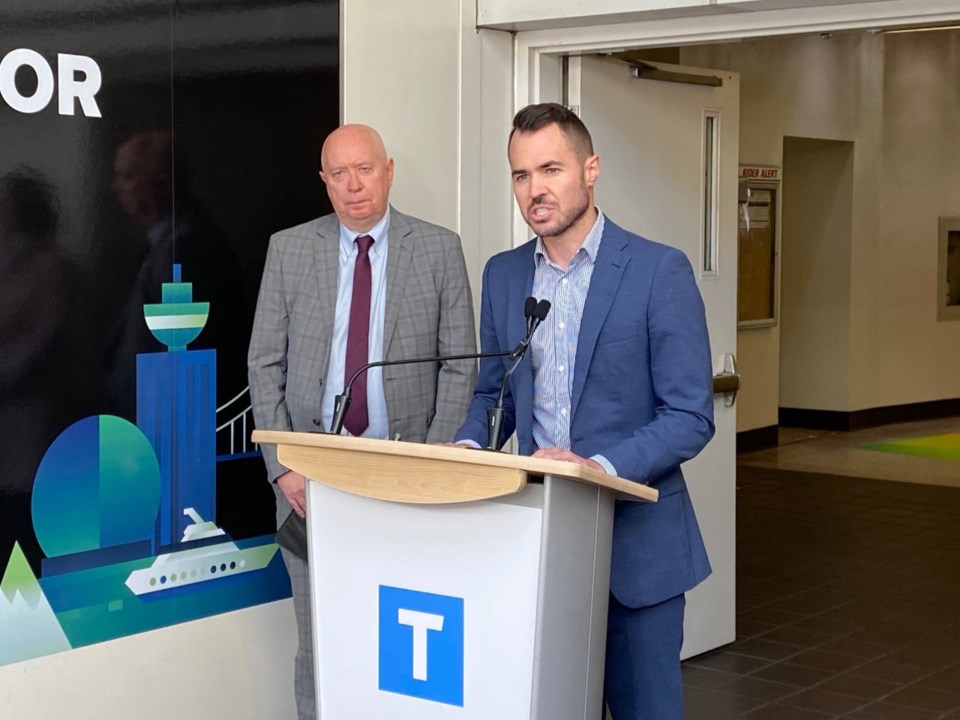Metro Vancouver mayors say if TransLink does not get $500 million in emergency relief funding to sustain current service levels until 2025, it will be forced to cut services.
The province’s regional transportation authority says its transit boardings are at 82 per cent of pre-pandemic levels. While this is the best rebound among major North American cities, it still means a funding gap exists. Adding to the funding gap is the rising costs of operations coupled by declining fuel tax revenues that are used to subsidize operations.
“Without relief funding, we face an impossible decision: cut service and raise fares to preserve the status quo of the existing system. We don’t want to go down that path,” said Port Coquitlam Mayor Brad West, chair of the Mayors’ Council, which oversees TransLink planning and funding models.
The council has written to the federal government asking it to provide $250 million, to be matched by the provincial government, which has not yet technically made such a commitment.
The half billion dollars is needed to maintain existing service levels and keep TransLink’s 10-year expansion plan on track, stated TransLink and the mayors.
Another ask is to have the federal government accelerate its planned, permanent transit fund by two years.
While ridership remains down, West said TransLink foresees overcrowding on buses, especially in municipalities south of the Fraser River, as population growth ramps up due to record-level federal immigration targets.
“This overcrowding problem is not short-lived. With newly increased record-level immigration targets we will see a wave of new Canadians coming to our region. The demands on our transit system are only going to increase. Maintaining current levels in the face of this growth is a recipe for a slow-moving crisis. Service will become more overcrowded and less attractive,” said West.
“Our challenge is no longer just about surviving the effects of the pandemic and inflation,” said West.
TransLink stated in a news release that based on federal projections an estimated 1.45 million people will immigrate to Canada and one in every eight newcomers will land in the Lower Mainland.
Joined by West for the funding request announcement at Waterfront Station in downtown Vancouver Tuesday was Burnaby Mayor Mike Hurley, Mayors’ Council vice-chair.
“We need a new funding model that provides a long-term sustainable solution for TransLink. We can’t keep asking transit users to pay more than their fair share when we all benefit from a well-funded transit system that gets cars off the road,” said Hurley.
New funding models that do not rely on so-called regressive sources, such as transit fares and property taxes, should be done via a new tripartite national commission with provinces, transit agencies and local governments, Hurley said.
A fourth demand from the council is to “permanently double the Canada Community-Building Fund (formerly known as the Gas Tax Fund) as was done in 2019, 2021 and 2022, and increase its annual escalator to 3.5 per cent to better reflect construction cost inflation.”
Financial figures for 2022 are not yet reported by TransLink but according to a 2021 corporate report, the organization took in revenues of $1.66 billion and spent $1.86 billion. It shed $271 million in transit fare revenues compared to 2019. TransLink saw a nearly $400-million bump in government transfers in 2020, which were reduced back to pre-pandemic levels in 2021. Operating costs have risen from $1.2 billion in 2017 to $1.44 billion in 2021.
TransLink has taken criticism in recent years for high executive compensations.
In 2020, it announced its executives would take pay cuts but the Canadian Taxpayers Federation reported this did not happen. In 2020, TransLink’s then-CEO Kevin Desmond took home $519,861 in total compensation, more than Canada’s other major transit bosses, the federation has stated.
West said TransLink is looking at ways to trim its own operating budget. He said the organization “is the right size for the job it is going to do.”
Kevin Quinn, who took the reins in 2021 and earns $450,000 in annual salary, said “over the last couple of years TransLink internally has identified over $200 million of cost savings since the pandemic. We recognize the need to manage our budget much more carefully …we've done that through a variety of service reductions…we also trimmed a good bit of administrative costs.”
Quinn said TransLink is attempting to raise revenue via a real estate development program.
Glacier Media has reached out to the provincial and federal governments for comment on TransLink’s latest requests, as well as TransLink on specific details of its own cost-saving measures.



